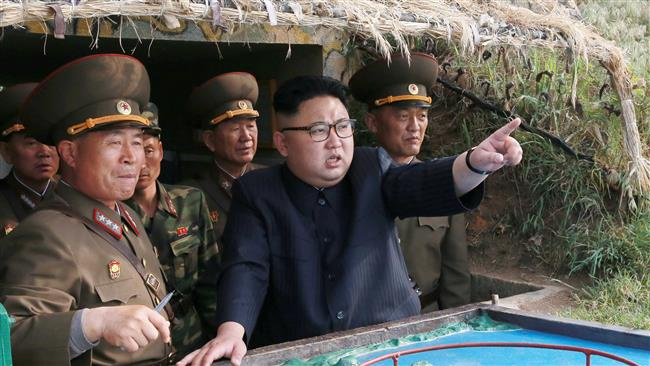North Korean Crisis a Break for Iranophobic Agenda

The recent North Korea crisis has led to a breakaway from Iranophobia among Trump and his team. The break coming after all the heavy propaganda, threats, and preparations has made Israel's PM Netanyahu worried, prompting him to resume his overseas hectic visits to avoid his Iranophobic efforts to go up in smoke.
The Republic of Syria used to have a strong army and stability. The civil war and the collapse of solidarity in the country have now turned it into Isaeli jets’ bailiwick. However, Syria is now regaining its relative calm, albeit with hard-won invaluable experience. Noting Hezbollah’s role in ISIS’ defeat in the Syrian war, Iran’s active role in the country and with Hamas in Gaza, particularly at a time Hamas openly declares its rapprochement with Iran and preparation for war, Netanyahu insists on not letting Iran 'siege' Israel.
In the meantime, Trump’s anti-Iran advisor Steven Bannon has resigned and John Bolton, former US Ambassador to the UN, himself a conservative anti-Iran racist, has revealed that Bannon collaborated in a plan to dismantle the nuclear deal, an unbinding agreement for Washington since the Congress has not passed it into law. Incompetent to understand such analyses, Trump seems to have forgotten that the accord is established by a UNSC resolution and the US could only make slight disturbances based on the old mutual hostilities. These nuisances could of course influence European banks and firms in their collaboration with Iran.
However, the emergence of the North Korea crisis has turned heads. In fact, US is more seriously concerned about North Korea and senses real danger there, because the Kim dynasty has brought the country in a place it has nukes and missiles but nothing else. In other words, it has nothing to lose and would have nothing to worry about in a potential war, except the costless lives of its obedient citizens. This situation, with an unconventionally reckless ruler, could lead to a dire, unpredictable situation. In contrast, US’ hostility against Iran is fed by Israel’s Iranophobic propaganda and provocative statements from certain domestic Iranian circles, both of which do not include a real confrontation. The Americans know that their call for inspection of Iran’s military centers is intended as a pressing tool and will never be accepted. They seem to have forgotten that if they succeeded to impose this on Saddam Hussein’s Iraq, it was because Iraq had invaded and occupied Kuwait, losing a stupid war after which it had to succumb to certain conditions for survival. Iran, on the other hand, has invaded no country and does not need to accept any of such conditions.
North Korea however is still in a state of war with the US. The end of the Korean War in the summer of 1953 was only an armistice around the 38th parallel, repeatedly violated. On the other hand, the US is committed to protect the security of South Korea and Japan. Despite North Korea’s middle-range missile test over the Japanese island of Hokkaido in a breach of international law, Japanese citizens have called on US to avoid a harsh response because they are afraid Japan and South Korea would have to pay the price. Russia and China are also concerned, in fear of N Korea’s desperate response to crippling sanctions.
The missile test has put America in a difficult situation. On the one hand, it has taken North Korea’s breach of international regulations to the UN Security Council, declaring all options are on the table, even though it has long become known as an empty threat. On the other hand, the US is expected to show reaction against such perilous indecencies. The question is why they did not shot the missile down while they were tracking it? Is it because they could not, or did not want to do so? Were they worried about a potential retaliation? Do they prefer a diplomatic solution? If so, what will the N Korean blackmail for? Could the US accept it?
Clearly, as has been the case in similar situations, the US would wish to overthrow the North Korean regime. However, there is no way into the isolated country. Any domestic movement seems farfetched considering Kim Jong-un’s brutal punishments and the tight security. Whether the UNSC condemns North Korea or not, the only way left is to use the same options on the table. The US would have to resort to surprise measures with simultaneous massive explosions, with many targets and casualties, in order to prevent any quick responses. Such measures could ring the alarm for Venezuela and others too, but the slightest mistake could prove a dangerous gamble. The US can destroy North Korea but South Korea and Japan have to pay for it. Bear in mind that the Korean conflict was almost solve under the Clinton administration, paving ground for family visits between citizens of the two states and South Korea’s investments in the North Korea’s border free zones. George W. Bush ruined it with his imprudent ‘axis of evil’ speech. The situation now is more critical, with no place for stupidity.
Despite common belief that the US is shifting its strategic attention from the Middle East to the East Asia, attention to the Pacific is nothing new. An increasingly powerful China is not new either. The Middle East has always been the world’s energy capital and there is a long way to go for alternative energy resources to take over. Supporting Israel against foreign threat is like a messianic duty for the US. The Korean issue will lead to negotiations or the final solution, which is war. However, the US will remain in the Middle East.

